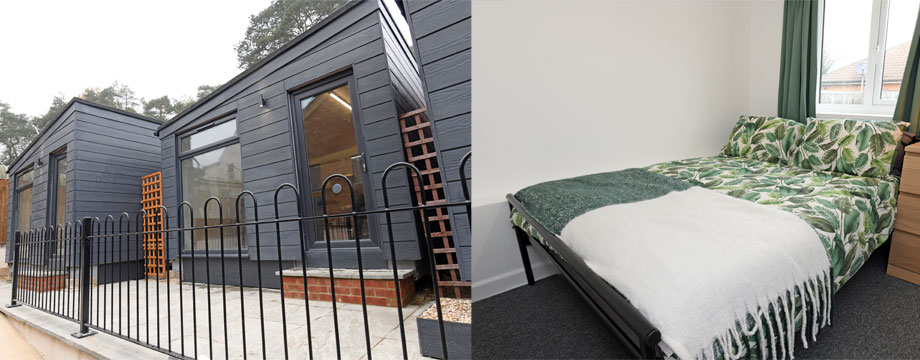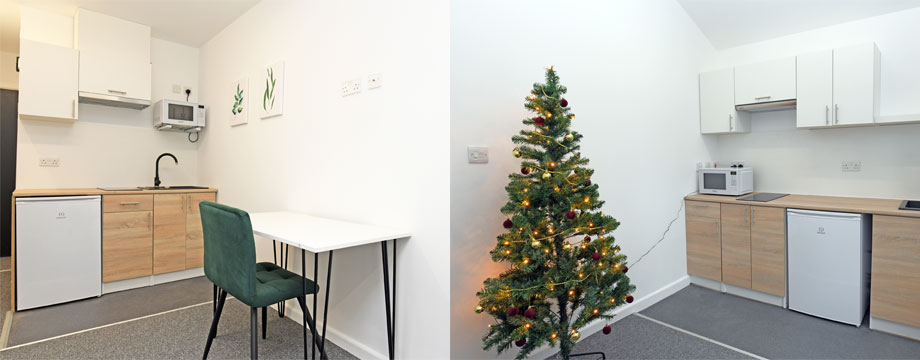New national data analysis has revealed the top 10 homelessness spots* in England, with Cornwall at the top of the list.
The research was commissioned by HAAUUSS, a spin off from Velocity RDT – a company which designs and manufactures affordable, technologically advanced temporary housing – to discover the extent of homelessness across local authorities in England.
The top ten areas are Cornwall, Manchester, Lewisham, Sheffield, Bristol, Wigan, Plymouth, Coventry, Greenwich and Waltham Forest.
The analysis also shows that local authorities with the highest levels of deprivation** still tend to have a larger number of households on the waiting list, and greater numbers in the reasonable preference categories. This category includes homeless people, those occupying insanitary or overcrowded housing, and people who need to move on medical or welfare grounds or to avoid hardship.

HAAUUSS recently collaborated with East Hampshire District Council and Two Saints, an organisation that offers support to those who have become statutory homeless, to transform an abandoned village hall in Bordon into high-tech, state of the art accommodation, which will be offered to individuals and families in temporary need.
The company approached East Hampshire District Council after it won an award from Geovation, a joint venture between HM Land Registry and Ordnance Survey, for the concept of repurposing existing buildings by putting modular housing into them, an idea CEO Simon Poyser came up with after realising from his work in commercial properties how much space was under-utilised. The award recognised the potential to move towards a greener, smarter approach that makes best use of assets which would otherwise go to waste. As the council does not own any housing stock and have limited land holdings, the partnership offered an ideal solution.
According to government figures, almost 30,000 households across Hampshire are waiting for a council home***, and the LGA has warned that there is a shortage of affordable housing.
HAAUUSS believes that the pilot project has the potential to provide an affordable solution for temporary homelessness while simultaneously tackling the problem of under-utilised buildings across the country.
They hope that this will be the first of many projects to remodel and repurpose abandoned buildings and disused plots of land into emergency accommodation with made to measure quality housing units which can be quickly assembled and dismantled as needed.
Although East Hampshire is in the bottom third of homelessness hotspots in the UK, coming 256 in the rankings, the area still has many factors which make it difficult to tackle homelessness, including house prices higher than the national average, a high house cost to earnings ratio, expensive private rents and land values which are well above the England average.

Pinewood Lodge will be the UK’s first housing project to repurpose a redundant community building by constructing self-contained dwellings inside it. Modular housing is becoming more widespread as a temporary solution to homelessness, but by using existing buildings to house the units, the Pinewood project also solves issues such as lack of available land, and also prevents the demolition of community buildings.
East Hampshire District Council’s housing options team will refer people who have become homeless to Pinewood Lodge for a temporary period while working with Two Saints to find them suitable long term accommodation.
This avoids out of area B&B placements and gives residents direct access to support, as there are staff on site. The site will provide a stepping stone to more settled accommodation, and help residents to gain the skills necessary to manage a tenancy.
Unlike many other modular homes, the Pinewood Pods also have a range of unique, technologically advanced features. They incorporate state of the art sensors which monitor movement, air quality, sound levels and building quality, including the detection of mould and feed the data back to the housing association so they can monitor the residences in real time. The sensors can detect problems such as faults in pipes before any ruptures happen, allowing for proactive maintenance, which is more cost effective than repairs. Intelligent sensor-controlled LED lighting and QR codes on household equipment bring up instruction manuals in a number of languages.
The Pods are environmentally friendly and energy efficient, with solar panels generating 15kw energy each day, smart heating, excellent insulation and sedum grass roofs, which remove CO2 from the environment.
Each unit is compact, but all include fitted kitchens and en-suite bathrooms, and are furnished in full and equipped with WiFi. Appliances such as televisions, and microwaves are supplied, as well as items such as furniture and bedding. The idea is that residents won’t need to purchase anything as they are likely to be on a low income, but there will be plenty of space for personal items, so that they can make it their own for the duration of their stay.

L-R: David Lindsay, Housing Development Officer, East Hampshire District Council, Jonathan Brunell, COO, HAAUUSS, a subsidiary of Velocity RDT,
Simon Poyser, CEO, HAAUUSS, and Mark Barnett, Housing Development Manager, East Hampshire District Council
Simon Poyser, CEO and Founder of Velocity RDT and HAAUUSS says: “We wanted to use our skills and technology to provide temporary housing of real quality, giving people a comfortable home where they can find stability and have some space to rebuild their lives, behind their own front doors.
“We came up with the idea for Pinewood Lodge as a solution to both the under-utilisation of many public buildings and the lack of available, high quality accommodation, and created a collection of advanced, smart, IoT connected buildings within a building.
“The pods are unique as they incorporate many cutting edge technological innovations as well as environmentally friendly features, providing homes that are not only functional but comfortable and make use of the very latest design features to offer the temporary residents a really comfortable quality of life for the duration of their stay.
“When we commissioned the research into homelessness, we were struck by the extent of the problem across the country. We want to continue to make an impact in helping local authorities address the housing crisis, and hope to create many more projects such as this one.”
Cllr Julie Butler, EHDC’s Portfolio Holder Deputy Leader and Portfolio Holder for Welfare, Housing & Community and Neighbourhood Quality Portfolio, says: "This is a clever and innovative way of tackling homelessness in East Hampshire and helping some of our most vulnerable residents.
"The pods are brilliantly designed, safe, private and environmentally friendly. They will give people secure and supervised accommodation at a time when they need it most of all.
"This scheme also makes fantastic use of a community building that no longer serves a purpose. I am really excited about seeing the pods complete but most of all I am looking forward to seeing them help people who have either fallen into, or are threatened by, homelessness.”
Steve Benson, chief executive officer, Two Saints, says: “We have a long-standing relationship with East Hampshire District Council and we're delighted to partner with them in providing support for this project. Repurposing the Whitehill and Bordon village hall is an excellent idea as it provides people who are homeless with much-needed accommodation and support while also making use of an otherwise empty community building, solving two issues in one.”
*The top ten figure has been arrived at using a bespoke combined measurement across both housing and homelessness data. This includes figures for:
- Waiting lists for housing
- Number of vacant dwellings
- Number of non-decent dwellings
- Numbers of people in temporary accommodation
- Eviction notices
** Figures from the English indices of deprivation https://www.gov.uk/government/statistics/english-indices-of-deprivation-2019
*** Figures from the Department for Levelling Up, Housing and Communities show 29,347 households were waiting for a council house in Hampshire as of the end of March.
- Log in to post comments















